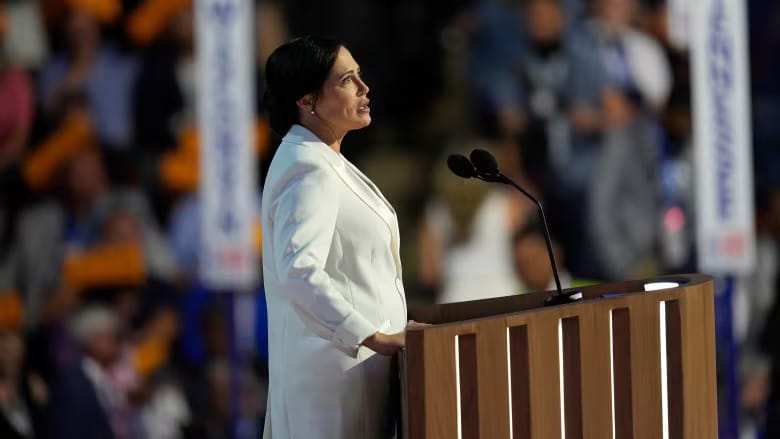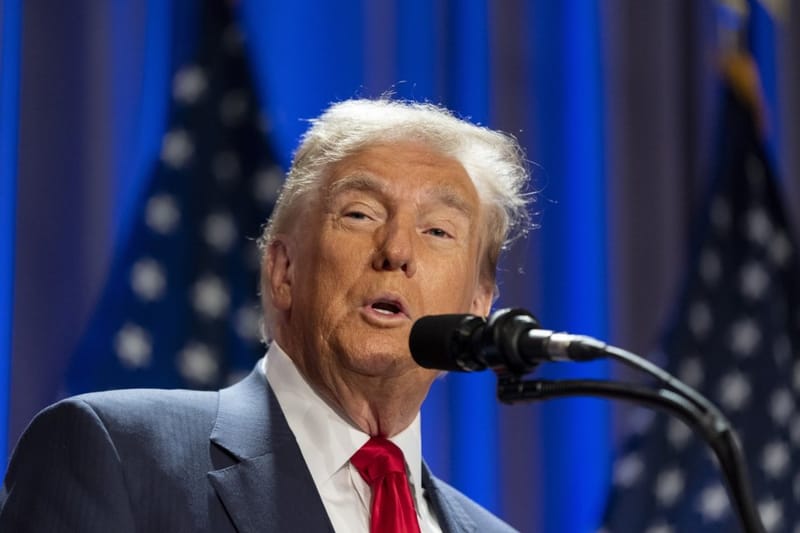Former Trump aides receive prime-time speaking engagements at the Democratic convention
"Being inside Trump's White House was terrifying," said Olivia Troye, a former counterterrorism adviser to then-vice-president Mike Pence.

American politics is awash right now in talk of surprise political endorsements. One in particular: reports suggest Robert F. Kennedy may abandon his presidential bid later this week and endorse Donald Trump.
Pundits are buzzing about whether the move might, or might not, give Trump a boost in a U.S. race expected to be a photo finish.
Amid that breaking news, a slower-rolling wave of endorsements has built up for months and finally crested at the Democratic convention.
It involves the slew of officials who worked for Trump now refusing to back his re-election bid, several of whom have endorsed Biden.
Trump isn't backed by his former vice-president; his second and third national-security advisers; several White House press officials; a chief of staff; and half his previous cabinet.
Now two officials from the Trump White House have spoken at the Democratic convention in Chicago to plead with Americans not to elect their former boss.
They included Trump's press secretary and a national-security official. That's atop other Republicans who addressed the convention.
"Being inside Trump's White House was terrifying," said Olivia Troye, a former counterterrorism adviser to then-vice-president Mike Pence.
"But what keeps me up at night is what will happen if he gets back there.… The guardrails are gone. The few adults in the room the first time resigned — or were fired."

She said Trump will undermine this next election, just like he did the last one, and she said American adversaries around the world are relishing this.
Addressing those members of her party watching from home, Troye said: "You aren't betraying our party. You're standing up for our country."
The crowd chanted, "U-S-A," as she spoke Wednesday.
'No empathy, no morals'
A day earlier, Trump's White House press secretary declared she'd be voting for Kamala Harris. Stephanie Grisham said she wasn't just a Trump supporter: "I was a true believer," she said, who spent her Easter, Thanksgiving and Christmas at his Mar-a-Lago residence.
Her breaking point, she said, came with the attack on the U.S. Capitol on Jan. 6, 2021; that's when a mob of Trump supporters tried stopping certification of the previous election.
She recalled asking then-first lady Melania Trump if they could release a statement supporting the right to protest — just not violently.

"[Melania] replied with one word: 'No,' Grisham said. She said that she immediately resigned that day.
She described seeing Trump in private settings, when cameras were off, and recalled him mocking his supporters — calling them "basement-dwellers."
On a hospital visit to an ICU where people were dying, she said, Trump got mad because cameras weren't focused on him.
"He has no empathy, no morals and no fidelity to the truth," Grisham said.
"He used to tell me, 'It doesn't matter what you say, Stephanie, say it enough and people will believe you.' But it does matter. What you say matters, and what you don't say matters."
Walz: 'They're warning us'
Grisham was often criticized for a precedent-destroying act in office: She did not hold a single daily White House press briefing. On Wednesday, said it's because she didn't want to be forced to lie.
"Now here I am, behind a podium," advocating for a Democrat because, she said, she loves her country more than her party.
Overhead, on the arena scoreboard at the convention, a video showed graphic scenes of violence from Jan. 6 – bodies of police officers being smashed, and Pence and other officials racing away for their safety, while Trump, at the White House, said nothing for hours.
The images were overlaid by audio of Trump talking about eventually pardoning the Jan. 6 convicts in his second term.
The crowd applauded an officer who protected the Capitol that day, Aquilino Gonell. "I was assaulted with a pole. Attacked with the American flag," he said. "President Trump sided with the attackers."
In a boisterous speech accepting the nomination for vice-president Wednesday, Minnesota Gov. Tim Walz mentioned the Republicans who'd addressed the convention.
"They were with him for four years. They're warning us the next four years would be much, much worse," said Walz, who, in his remarks, sought to define freedom on Democrats' terms: as access to quality education and health care; the right to same-sex marriage and abortion; and freedom from fear of school shootings.
He led the crowd in chants of, "We're not going back."
Reaching persuadable voters
These convention speakers are Democrats' attempt to reach a tiny — yet critical — slice of American voters: the few who can be persuaded to switch parties.
"[They're] a very small subset of the American population," decades-long party strategist Robert Creamer told a strategy workshop during the convention.
"But they're important."
Trump attempted something similar at his convention last month, inviting several former Democratic voters to speak on stage about their reasons for switching.
At the Democratic convention, the party-switchers happened to include more prominent names, like the former lieutenant-governor of Georgia, a Republican, who described having police officers stationed outside his house because he wouldn't help Trump overturn the election.

"Let's get the hard part out of the way: I am a Republican. But tonight I stand here as an American," Geoff Duncan said.
"His actions disqualify him from ever, ever, ever stepping foot in the Oval Office again."
Duncan also looked into the camera, addressing any Republicans watching. Millions of them, he said, are tired of making excuses for Trump.
He likened their party now to a cult led by a felonious thug.
"[Our party now is] not civil or conservative. It's chaotic and crazy," Duncan said. "The only thing left to do is dump Trump."
He added: "If you vote for Kamala Harris in 2024 you're not a Democrat — you're a patriot." Again, people chanted, "U-S-A!"
Other convention speakers have rallied around a similar theme: Casting the election as one candidate who cares about others versus one who doesn't.
Or as former president Bill Clinton described the election on Wednesday night: "We the people," versus "Me, myself and I."
Polls suggest the race is deadlocked. In a game of inches, every twitch, one way or the other, could make a difference. Endorsements could matter.
We'll learn soon if reports are accurate — that Trump could get Robert Kennedy. Deciphering the electoral consequences will take a little longer.





